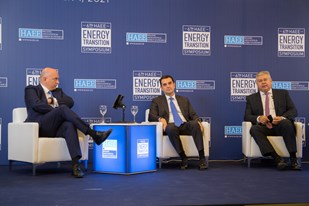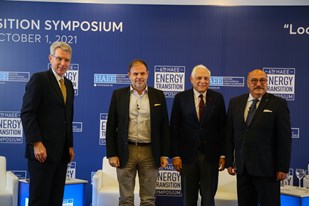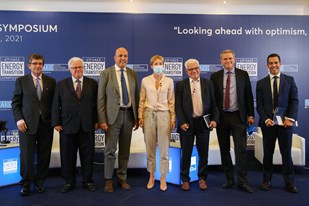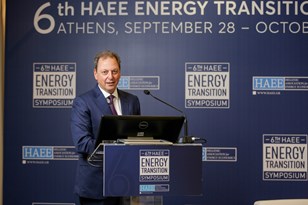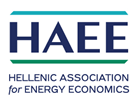ΔΕΛΤΙΟ ΤΥΠΟΥ Αθήνα, 7 Οκτωβρίου 2021 | Με επιτυχία ολοκληρώθηκε το 6ο Συμπόσιο για την Ενεργειακή Μετάβαση το οποίο διήρκησε 4 ημέρες, από την Τρίτη 28 Σεπτεμβρίου έως την Παρασκευή 1 Οκτωβρίου 2021 και πραγματοποιήθηκε στο ξενοδοχείο Theoxenia Palace στην Κηφισιά. Για ακόμη μία χρονιά, το ετήσιο Συμπόσιο της Ελληνικής Εταιρείας Ενεργειακής Οικονομίας λειτούργησε ως μια πλατφόρμα ανοιχτού διαλόγου, και συγκέντρωσε εκπρόσωπους από τον επιχειρηματικό κόσμο, εκπροσώπους του πολιτικού γίγνεσθαι της χώρας, φορείς της δημόσιας διοίκησης, καθώς και έγκριτους ακαδημαϊκούς, που συνέβαλαν τα μέγιστα στις συζητήσεις και στην ανταλλαγή απόψεων για κρίσιμα ενεργειακά και οικονομικά ζητήματα. Μέσα από 30 συνεδρίες με θεματικές που κάλυπταν ολόκληρο τον ενεργειακό τομέα, και πάνω από 130 ομιλητές, το Συμπόσιο διατήρησε το διεθνή, εξειδικευμένο, ακαδημαϊκό και εκπαιδευτικό χαρακτήρα του, παρέχοντας στους διαδικτυακούς, αλλά και με φυσική παρουσία συμμετέχοντες, ενδελεχή ανάλυση των υπό συζήτηση θεμάτων. Μεταξύ των θεματικών που συζητήθηκαν και αναλύθηκαν εις βάθος είναι οι εξής: Στο φιλόδοξο σχέδιο της κυβέρνησης για την απανθρακοποίηση και την απεξάρτηση του ελληνικού ενεργειακού τομέα από τον άνθρακα που θα οδηγήσει στην εξοικονόμηση δισεκατομμυρίων ευρώ λόγω της απόσυρσης των παλιών λιγνιτικών μονάδων και της αντικατάστασής τους με ΑΠΕ πολύ χαμηλότερου κόστους, επικεντρώθηκε η θεματική του πρώτου πάνελ συζήτησης, κατά την οποία επισημάνθηκε ο πρώτος διαγωνισμός των συστημάτων αποθήκευσης που θα λάβει χώρα κατά το πρώτο τρίμηνο του 2022 με προϋπολογισμό 200 εκ. ευρώ. H νέα ηλεκτρική διασύνδεση της Ελλάδας και της Βουλγαρίας που θα τεθεί σε λειτουργία στα μέσα του επόμενου έτους, μαζί με τη νέα διασύνδεση φυσικού αερίου, ήταν μεταξύ των εξελίξεων που συζητήθηκαν διεξοδικά. Η σημασία της περιφερειακής σύζευξης και των ενεργειακών συναλλαγών, ιδίως στον τομέα της ηλεκτρικής ενέργειας, ήταν επίσης στο επίκεντρο των θεματικών που αναλύθηκαν εις βάθος. Οι διευθύνοντες σύμβουλοι των Χρηματιστηρίων Ενέργειας Ελλάδας, Βουλγαρίας και Ρουμανίας τόνισαν την ανάγκη αύξησης των δικαιωμάτων μεταφοράς σε τρίτες χώρες και επέκτασης της σύζευξης για την αύξηση των όγκων στην αγορά της επόμενης ημέρας. Το ιδιαίτερα αυξημένο ενδιαφέρον για PPAs τόνισαν οι εμπειρογνώμονες στον τομέα της ενέργειας. Μια εταιρεία που προσφέρει εργαλεία αντιστάθμισης κινδύνου είναι σημαντική για τους παίκτες της αγοράς. Στην αρχή, καθώς οι τράπεζες θα προσαρμόζονται στη νέα πραγματικότητα, θα υπάρχει ένα μείγμα PPAs και παραδοσιακών μηχανισμών στήριξης. Όσον αφορά στους παραγωγούς ανανεώσιμων πηγών ενέργειας, η τραπεζική στήριξη είναι απαραίτητη, όπως και η μείωση του ρίσκου από την αγορά εξισορρόπησης. Η αποθήκευση ενέργειας θα χρειαστεί κάποιου είδους στήριξη στα πρώτα στάδια ανάπτυξής της. Όσον αφορά στην ενεργειακή μετάβαση και τις προκλήσεις της βιωσιμότητας, ακαδημαϊκοί και ειδικοί του κλάδου της ενέργειας επεσήμαναν ότι για την επίτευξη των στόχων του 2030 για υψηλή διείσδυση των ανανεώσιμων πηγών ενέργειας, τα αποθέματα είναι πολύ σημαντικά. Παράλληλα, ανέφεραν ότι η διαρθρωτική μεταστροφή του τραπεζικού τομέα προς τις πράσινες και βιώσιμες επενδύσεις, είναι μια αλλαγή που δημιουργεί ευκαιρίες και προσελκύει ανταγωνισμό και επενδύσεις. Το μέλλον της ελληνικής αγοράς ΑΠΕ είναι ελπιδοφόρο, καθώς βάσει των τελευταίων στοιχείων για τις συμβάσεις ΑΠΕ στην Ελλάδα, αναμένεται να φτάσουν τα 2 GW μέσα στο 2022. Επιπλέον, υπάρχει έντονο ενδιαφέρον από ξένους επενδυτές για 14 στρατηγικές επενδύσεις σε ΑΠΕ συνολικής ισχύος 5,4 GW. Η διαχείριση κινδύνων, η ασφάλεια και άλλες υπηρεσίες σε όλο το φάσμα των ανανεώσιμων πηγών ενέργειας είναι μια εικόνα που θα δούμε σύντομα. Ωστόσο, θα πρέπει να δοθεί έμφαση στις ταχύτερες διαδικασίες αδειοδότησης, ενώ το πλαίσιο για την αποθήκευση ενέργειας πρέπει να αναπτυχθεί για να επιτρέψει ακόμη περισσότερες επενδύσεις. Αναφορικά με την πολύ σημαντική ανάπτυξη της υπεράκτιας αιολικής ενέργειας στην Ελλάδα, θα πρέπει να δοθεί προσοχή στον ειδικό σχεδιασμό, τη σύνδεση με το δίκτυο, τα κριτήρια εγκατάστασης και το μέγεθος των εγκαταστάσεων. Στο Συμπόσιο δόθηκε έμφαση στις απρόβλεπτες συνέπειες της κλιματικής αλλαγής στη γεωργία, ενώ ανακοινώθηκε η σύσταση επιτροπής για την ερημοποίηση, καθώς και συμπληρωματικά μέτρα για τη στήριξη της χρήσης ανανεώσιμων πηγών ενέργειας και την εξοικονόμησης ενέργειας στον εν λόγω τομέα. Ο μετασχηματισμός του ελληνικού διαχειριστή του συστήματος διανομής είναι ένα ακόμη εργαλείο για την αντιμετώπιση της κλιματικής αλλαγής. Για τα επόμενα οκτώ χρόνια αναμένονται επενδύσεις τριών δισεκατομμυρίων ευρώ σε δίκτυα, ενώ από αυτά τα 0,5 δισεκατομμύρια ευρώ αφορούν στην επίτευξη των στόχων του ΕΣΕΚ. Προς αυτή την κατεύθυνση, το έργο των ρυθμιστικών αρχών είναι κρίσιμο και, ως εκ τούτου, είναι αυξημένο, προκειμένου να διευκολυνθεί η ενεργειακή μετάβαση και η λειτουργία της αγοράς. Επιπλέον, η Επιτροπή σχεδιάζει να αυξήσει τη φορολόγηση των ορυκτών καυσίμων τα επόμενα δέκα χρόνια, ενώ η φορολόγηση της ενέργειας θα βασίζεται στο ενεργειακό περιεχόμενο και όχι στον όγκο όπως ίσχυε, δίνοντας προτεραιότητα στην κατάταξη των καυσίμων που συνεισφέρουν στην απανθρακοποίηση. Παράλληλα, η ΕΕ προωθεί ένα μεγάλο κοινωνικό πακέτο ύψους 72 δισ. Ευρώ, εκ των οποίων τα 4 δισ. ευρώ να προορίζονται για την Ελλάδα, προκειμένου να προστατευθούν οι ευάλωτοι καταναλωτές και οι μικρές επιχειρήσεις κατά τη διαδικασία της ενεργειακής μετάβασης. Η άνοδος των τιμών του φυσικού αερίου είναι έντονη φέτος, ενώ ταυτόχρονα η αποθήκευση φυσικού αερίου στην Ευρώπη είναι περιορισμένη και, ως εκ τούτου, υπάρχει απειλή για την ενεργειακή ασφάλεια σε περίπτωση που υπάρξει ένας σκληρός χειμώνας. Η ζήτηση για φυσικό αέριο αυξήθηκε σημαντικά στην Ελλάδα και παγκοσμίως κατά τη διάρκεια του 2021. Τα δίκτυα φυσικού αερίου με έμφαση στο CNG και το LNG θα επεκταθούν σε πολλές νέες πόλεις και περιοχές στην Ελλάδα μέσα στα επόμενα χρόνια. Ο τομέας του φυσικού αερίου στην Ελλάδα αναπτύσσεται και εισάγονται νέες τεχνολογίες, όπως το υδρογόνο και η παραγωγή βιομεθανίου για την απανθρακοποίηση του τομέα αυτού. Το υδρογόνο και τα ανανεώσιμα αέρια είναι ένας σημαντικός και αναδυόμενος τομέας στην Ελλάδα και την Ευρώπη. Η ελληνική στρατηγική για το υδρογόνο βρίσκεται στο τελικό της στάδιο και προωθούνται πέντε στρατηγικά έργα για να χρηματοδοτηθούν από το IPCEI της ΕΕ. Ιδιαίτερη έμφαση δόθηκε, στον αναδυόμενο τομέα της ηλεκτροκίνησης στην ελληνική αγορά. Η ταχεία εξέλιξη του δημόσια προσβάσιμου δικτύου φόρτισης αντιμετώπισε πολλές προκλήσεις που σχετίζονται με την έλλειψη ευαισθητοποίησης των ενδιαφερομένων, τους περιορισμένους χώρους στάθμευσης και την έλλειψη χωρητικότητας σύνδεσης σε ορισμένες εγκαταστάσεις. Η δημόσια φόρτιση αναμένεται να είναι πιο σημαντική στην Ελλάδα σε σύγκριση με άλλες ευρωπαϊκές χώρες. Η επόμενη ημέρα επικεντρώνεται στην επέκταση του αστικού δικτύου και του δικτύου αυτοκινητοδρόμων και στην υψηλότερη διείσδυση της πράσινης ενέργειας. Είναι ζωτικής σημασίας η ανάπτυξη έξυπνων και διαλειτουργικών υποδομών με διαφανή τιμολόγηση και απρόσκοπτες λύσεις πληρωμών. Τέλος, με δεδομένο ότι τα νησιά έχουν μείνει πίσω στην ενεργειακή μετάβαση, η κυβέρνηση προχωρά σε μια μεγάλη προσπάθεια για την ένταξή τους (πρωτοβουλία Greco Island), ενώ έχουν μπει σε εφαρμογή ευρωπαϊκά προγράμματα και χρηματοδοτικά εργαλεία με επίκεντρο τη νησιωτική Ελλάδα. Ο εξηλεκτρισμός και στη συνέχεια ο εκσυγχρονισμός των δικτύων, οι πράσινες μεταφορές και η αποθήκευση ενέργειας είναι οι κύριες δράσεις που θα υλοποιηθούν στα νησιά με οδηγό την Αστυπάλαια και την Χάλκη, που ανοίγουν το δρόμο για την απεξάρτηση των νησιών από τον άνθρακα. Πλήρη και ουσιαστική ανάλυση όλων των θεματικών που συζητήθηκαν θα περιλαμβάνεται στο Report του Συμποσίου, το οποίο θα είναι διαθέσιμο το προσεχές διάστημα. Περισσότερες πληροφορίες σχετικά με τους ομιλητές, την ατζέντα και τις on-demand συνεδρίες του 4ήμερου Συμποσίου, μπορείτε να βρείτε στην ιστοσελίδα της Ελληνικής Εταιρείας Ενεργειακής Οικονομίας, πατώντας εδώ. ----------------- ΥΠΟ ΤΗΝ ΑΙΓΙΔΑ ΥΠΟΥΡΓΕΙΟ ΠΕΡΙΒΑΛΛΟΝΤΟΣ ΚΑΙ ΕΝΕΡΓΕΙΑΣ ΜΕ ΤΗΝ ΥΠΟΣΤΗΡΙΞΗ ΠΛΑΤΙΝΕΝΙΟΣ ΧΟΡΗΓΟΣ ΕΛΛΗΝΙΚΑ ΠΕΤΡΕΛΑΙΑ ΧΡΥΣΟΙ ΧΟΡΗΓΟΙ HOWDEN MATRIX | HUAWEI / SKE | OMEXOΜ/VINCI ENERGIES HELLAS ΑΣΗΜΕΝΙΟΙ ΧΟΡΗΓΟΙ AKUO ENERGY GREECE | ENERDIA | ΟΜΙΛΟΣ ΧΡΗΜΑΤΙΣΤΗΡΙΟΥ ΕΝΕΡΓΕΙΑΣ | ΔΕΔΔΗΕ | HENGAS | ΕΔΕΥ | INTRAKAT | ΕΘΝΙΚΗ ΤΡΑΠΕΖΑ | ΔΕΗ | ΔΕΗ ΑΝΑΝΕΩΣΙΜΕΣ | SENFLUGA | ΣΠΥΡΟΠΟΥΛΟΣ ΑΕ ΥΠΟΣΤΗΡΙΚΤΕΣ CITROEN | ΔΕΠΑ ΕΜΠΟΡΙΑΣ | ΔΕΔΑ | DELOITTE | ΕΔΑ ΘΕΣΣ | ENEL GREEN POWER | EUNICE ENERGY GROUP | ΕΥΔΑΠ | ΦΥΣΙΚΟ ΑΕΡΙΟ ΕΛΛΗΝΙΚΗ ΕΤΑΙΡΕΙΑ ΕΝΕΡΓΕΙΑΣ | ΔΕΣΦΑ | INACCESS NETWORKS | INVENERGY | NEW ENERGY PARTNERS | NRG | PROTASIS ENGINEERING & CONSULTING | ΔΑΠΕΕΠ | VOLTALIA ΣΤΡΑΤΗΓΙΚΟΙ ΕΤΑΙΡΟΙ AMCHAM | ATLANTIC COUNCIL | CIRCLE THE MED FORUM | CIRCULAR ECONOMY & CLIMATE CHANGE INSITUTE EPLO | ENERGY DELTA INSTITUTE | EPRINC | EUROPEAN SOCIETY FOR ENGINEERS AND INDUSTRIALISTS | GLOBAL GAS CENTRE | HWEA | IANOS PROJECT | EU ISLANDS FACILITY NESOI ΑΚΑΔΗΜΑΙΚΟΙ ΕΤΑΙΡΟΙ ΑΠΘ | AUDENCIA BUSINESS SCHOOL ENERGY MANAGEMENT CENTRE | ESCP BUSINESS SCHOOL – EMC | ENERGY TRANSITION & SUSTAINABILITY CENTER OF AUDENCIA | IEESL | MASTER’S IN BUSINESS ADMINISTRATION – ΑΠΘ | ΠΟΛΥΤΕΧΝΕΙΟ ΚΡΗΤΗΣ ΜΕΣΑ ΠΡΟΒΟΛΗΣ CNN NEWS | ENERGYPRESS.GR | ENERGYWORLD.GR | ESGSTORIES.GR | INSIDER.GR PRESS RELEASE Athens, October 7th, 2021 | The 6th Energy Transition Symposium entitled “Looking Ahead with Optimism, Beyond the Covid Era”, was held from Tuesday, 28 September to Friday, 1 October 2021, at Theoxenia Palace Hotel, in Kifissia, Athens. For yet another year, the annual Symposium of the Hellenic Association for Energy Economics served as an open-dialogue platform, and brought together a roster of exceptional business leaders, top executives and seasoned public officials, and academia, who contributed the maximum to debates and exchange of views on crucial energy and economic matters that shape our world. Considering the extraordinary circumstances of 2021, the 6th Symposium focused on the turbulences caused by the Covid-19 pandemic and its prints on the global energy system. Despite the sharp decrease in global emissions last year, due to the recession of economic activities, enormous efforts are still required to reach the ambitious target of a net zero carbon economy. Governments need to take decisive actions and implement structural measures to accelerate the clean energy transition and pave the way towards a sustainable recovery. On top of that, renewable energy solutions can play a key role, providing a fast response to the pandemic and building more resilient energy systems. Through 30 sessions with topics covering the entire energy sector and over 130 speakers, the Symposium maintained its international, specialized, academic, and educational character, providing participants with substantial knowledge. Among the topics discussed was the decarbonization of the Greek energy sector, underlying the ambitious decarbonization plan that the government has enacted, which will lead to the saving of billions of euros, because of the decommissioning of older lignite plants and their replacement with renewables of much lower cost. At the same time, emphasis was given to the first tender for storage systems that is expected to take place during the first quarter of 2022 with a budget of 200 million euros. Another significant development highlighted was the new power interconnection of Greece and Bulgaria that will become operational by the middle of next year, along with the new natural gas interconnector. The importance of regional coupling and energy exchanges, especially in electricity were, also, at the center of the discussions. CEOs of Energy and Commodities Exchange highlighted the need of increasing transfer rights with third countries and expanding the coupling to increase volumes in the day ahead market. Additionally, it was announced that the natural gas exchanges’ platform will operate after Crete’s interconnection to the mainland grid. There is an increased appetite for PPAs, as it was stated by the energy experts. Taking advantage of a partner that offers hedging tools is significant for the market players. At the beginning, as banks adjust to the new reality, there will be a mix of PPAs and traditional support mechanisms. When it comes to renewable producers, bankability is essential, and they need to avoid the risk of increased cost as a result of the need for balancing. Energy storage will need some kind of support at its first stages of development. Concerning energy transition and sustainability challenges, academics and energy experts pointed out that for achieving 2030 goals of high renewables penetration, reserves are very important in an environment. At the same time, they mentioned that the structural swift of the banking sector towards green and sustainable investments is a change that creates opportunities and attracts competition and investments. The future of Greek RES Market is promising, since the latest data on renewables contracts in Greece, are expected to reach 2 GW in 2022. Additionally, interest for 14 strategic investments in renewables with a total capacity of 5.4 GW was expressed by foreign investors. Risk management, insurance and other services that touch upon the entire renewables’ spectrum, offer a glimpse of future potentials and developments. However, emphasis should be given on faster licensing procedures, while the energy storage framework needs to be developed to allow even more investments. Concerning the very important development of offshore wind energy in Greece, attention should be given to the special planning, the grid connection, the installation criteria and the scale of installations. The unforeseen consequences of climate change in agriculture were also highlighted. The establishment of a committee against desertification and for the support of renewables and energy saving in the agricultural sector was also announced during the Symposium. The transformation of the Greek distribution system operator is one more stock-in-trade against climate change. Three billion euros of investment in grids are coming for the next eight years, while 0.5 billion of this concern the achievement of NECP goals. Towards this direction, the work of the regulators is crucial and is, therefore, increased in order to facilitate the transition and every necessary process of the market's nominal operation. Additionally, the Commission plans to increase the taxation of fossil fuels in the upcoming ten years, while Energy Taxation will move from volume-based into energy content-based, prioritizing ranking in minimum taxation to decarbonize the sector. At the same time, the EU has created a large social package of 72 billion euros with 4 billion earmarked for Greece in order to protect vulnerable consumers and small businesses during the process of the energy transition. The rise of the energy prices was also at the epicenter of the discussions. The relative policies and initiatives, along with the role of natural gas as a transitional fuel and RES as the most competitive solution towards the energy transition were in depth analyzed. This year’s sharp rise of natural gas prices, along with shortage of gas storage in Europe, create a threat for energy security, in case there is a harsh winter. Demand for natural gas was significantly increased in Greece and globally during 2021. Natural gas networks with emphasis on CNG and LNG will be expanded to many new cities and regions in Greece in the coming years. The natural gas sector in Greece is being developed and new technologies like hydrogen and production of biomethane are being introduced to decarbonize the sector. Hydrogen and renewable gases are an important and emerging sector in Greece and Europe. Greek hydrogen strategy is in its final stages and five strategic projects are being promoted to be financed by EU IPCEI. The need for repurposing and fully integrating the current assets in the framework of new stricter directives was highlighted, whereas competency, coherency and constancy are recognized as main pillars of the energy transition. E-mobility is another emerging sector in Greece. The fast evolution of publicly accessible charging network faced a lot of challenges related to lack of awareness of stakeholders, limited parking spaces and lack of connection capacity in some installations. Public charging is expected to be more important in Greece compared to other European countries. The next day focuses on the expansion of urban and highway network and the higher penetration of green energy. It is crucial to roll out smart and interoperable infrastructure with transparent pricing and seamless payment solutions. Last but not least, given the fact that the islands have fallen behind in the energy transition in terms of the power mix and emissions, the government proceeds with a grand effort to include them (Greco Island initiative), while European programs and financing mechanisms dedicated to islands have been introduced. Electrification followed by network modernization, green transportation and energy storage are the main actions that will be implemented in the paradigm islands, such as Astypalea and Chalki that pave the way for islands’ decarbonization. The Symposium’s Report with full and substantial analysis of the thematics discussed will follow shortly. The Symposium was honored by the presence of Greek Government representatives, Kostas Skrekas, Minister of Environment and Energy, Adonis Georgiadis, Minister of Development and Investments, Kostas Ach. Karamanlis, Minister of Infrastructure and Transport, Spilios Livanos, Minister of Rural Development and Food, Alexandra Sdoukou, General Secretary of Energy and Mineral Resources, Ministry of Environment and Energy and Konstantinos Aravossis, General Secretary of Natural Environment and Water, Ministry of Environment and Energy. Keynote remarks were also given by Maria Spyraki, Member of the European Parliament, Peti Perka, Member of Parliament Florina, Deputy Head of Environment & Energy Sector, SYRIZA, Giorgos Arvanitidis, Member of Parliament Thessaloniki B, Director of Environment and Energy Sector, KIN.AL., Giorgos Patoulis, Governor of Attica Region, George Kasapides, Regional Governor of Western Macedonia, Hellenic Republic and Konstantinos Gioutikas, Vice-Governor of Development and Environment, Central Macedonia Region. Geoffrey Pyatt, US Ambassador to the Hellenic Republic, Matthew Lodge, UK Ambassador to the Hellenic Republic and Enrique Viguera Rubio, Spanish Ambassador to the Hellenic Republic, attended physically the Symposium, offering valuable insights. The Greek energy industry was represented by CEOs and senior executives of public and private companies, academics and public institutions representatives, namely, Andreas Shiamishis, CEO of Hellenic Petroleum S.A., Pantelis Capros, Professor of Energy Economics at NTUA, George Ioannou, CEO of Hellenic Energy Exchange Group, Nikos Frydas, Principal, Energy Advisory, Grant Thornton S.A., Yiannis Yiarentis, President and CEO of DAPEEP, Andreas Poullikkas, Chairman, Cyprus Energy Regulatory Authority, Konstantinos Tomaras, General Director, Spyropoulos S.A., Maria Rita Galli, CEO, Hellenic Gas Transmission System Operator S.A, Panagiotis Papastamatiou, Director, ENTEKA; CEO, Hellenic Wind Energy Association, Spyros Kiartzis, Manager, New Technologies and Alternative Energy Sources, HEL.PE., Antonis Mountouris, Group HSE & Sustainable Development Manager, HEL.PE., Theodoros Tsakiris, Assoc. Professor of Geopolitics and Energy Policy at University of Nicosia’s Business School, Anastasios Tosios, Deputy CEO, EYDAP, Aristofanis Stefatos, CEO of Hellenic Hydrocarbon Resources Management S.A., Panagiotis Mitrou, Global Gas Segment Manager at Lloyd’s Register Marine & Offshore, George Kavvouras, General Manager, Omexom/Vinci Energies Hellas, Anastasios Manos, CEO, Hellenic Electricity Distribution Network Operator, Vassilis Kalavrouziotis, Head of Software Development & Energy Management, Eunice Energy Group, Aristotelis Chantavas, Head of Europe area, Enel Green Power; President, SolarPower Europe, Konstantinos Eleftheriadis, Partner, Energy Industry Leader, Deloitte, Giannis Klavdianos, CFO, Coordinating Director of Accounting & Finance, Harry Damaskos, Principal, European Bank for Reconstruction and Development, Despina Tomadaki, Senior Loan Officer, European Investment Bank, Dimitris Pefanis, Director of Financial and Business Content, DPG Digital Media, Athanasios Dagoumas, President, Regulatory Authority for Energy, Konstantinos Mavros, CEO, PPC Renewables, Loukas Lazarakis, General Manager, Head of Energy Unit, Intrakat, Tasos Athanasopoulos, President and CEO, Enerdia S.A., Grigoris Marinakis, General Manager, Voltalia Greece, Edmond Airantzis, co-Founder, New Energy Partners, Tasos Garis, Founder and Director, Garis Partners, Kyriakos Kofinas, General Director, e-mobility, PPC, Elias Petris, Strategy and Business Development Manager, NRG, Vasilis Georgiou, Managing Director, Protasis, Panagiotis Ekaterinidis, Marketing Manager, Citroen, DS Automobiles, Athanasios Cholevas, Head Global Market Solutions, Corporate Transaction Banking, National Bank of Greece, Christos Georgopoulos, CEO, Inaccess, Guillaume Dupret, Energy Market Director, Akuo Energy, Constantinos Papalucas, Energy Expert, Coordinator of the National Hydrogen Committee, Giorgos Filiopoulos, CEO, Enterprise Greece, Vasilis Machias, Country Manager Greece, Axpo Solutions, Panagiotis Doumas, Director and Member of the Executive Committee, Howden-Matrix, Haris Floudopoulos, Journalist at capital.gr, Eleni Charisi, Natural Gas Market Reporter, Argus Media, Faidra Mavrogiorgi, Journalist and Owner ESG stories, Nikolaos Koutsogiannis, Advisor to the Board, HENGAS S.A., Thodoris Panagoulis, Editor in Chief, energypress.gr, Thomas Lamnidis, Managing Director, Lamnidis Law; Principal and Legal Advisor, Savvy Business sLTD, Vasilis Roussakis, Deputy Mayor of Economic Growth, Municipality of Chalki, George Moutzorogeorgos, Energy Specialist, Advisor to the Secretary General of Energy and Mineral Resources, Giorgos Kremlis, Principal Advisor to the Greek Prime Minister on Energy, Climate and Circular Economy Issues; President, International “Circular Clima Institute” of the European Public Law Organization, Nektaria Karakatsani, Advisor to the Minister of Environment and Energy, Gerassimos Thomas, Director General Taxation and Customs Union, European Commission, Theodora Antonakaki, Director of Climate Change and Sustainability Centre, Bank of Greece, Maria Christantoni, Sustainability Officer, Hellenic Republic Asset Development Fund, Haris Doukas, Associate Professor at the School of Electrical and Computer Engineering, National Technical University of Athens & Gen. Secretary of HELORS, Thanos Zarogiannis, Electric Vehicles Charging Specialist & Advisor on Electromobility, Dimitris Papastergiou, President, Central Union of Municipalities in Greece (KEDE); Mayor of Trikala Municipality, Panagiotis Grammelis, Director of Research at the Chemical Process and Energy Resources Institute at CERTH, Agis Papadopoulos, Chairman of the Board, EYATH; Professor, Aristotle University of Thessaloniki, Dimitrios Kardomateas, Representative of the Chairman of the JTDP Steering Committee, Nikos Chatziargyriou, Professor, National Technical University of Athens; Past Chairman and CEO, HEDNO, Spyros Economou, President of the BoD at CRES and Kostas Andriosopoulos, Professor of Energy Economics, Audencia Business School. From international companies, organizations, academic institutions and think tanks, the Symposium was honored by the participation of Victor Grigorescu, former Minister of Energy of Romania, Konstantin Konstantinov, CEO, Independent Bulgarian Energy Exchange, Richard Morningstar, Founding Director and Chairman, Global Energy Center at the Atlantic Council, Former US Ambassador to the Rep. of Azerbaijan & Former US Ambassador to the EU, David Livingston, Senior Advisor, US Department of State, Nikos Tsafos, James R. Schlesinger Chair for Energy and Geopolitics, CSIS, Jean-Michel Glachant, Director, Florence School of Regulation; Holder of the Loyola de Palacio Chair, Symeon Kassianides, Founder, Chairman and CEO, Hyperion Systems Engineering Group; Chairman, Natural Gas Public Company, Cyprus, Nuno Marinho, Head of RES Integration and Flexibilty, NEW R&D - Centre for New Energy Technologies, EDP – Energias de Portugal, Coordinator of IANOS project, Ricardo Raineri, Professor at Pontificia Universidad Católica of Chile, Former Energy Minister of Chile; Member of the WG on Energy Transition, UN DESA, Matteo Mazzoni, Head of Market Strategy, Snam, main Shareholder of Senfluga, Marcel Kramer, Energy & Infrastructure Consultant; President, Energy Delta Institute, Nicolò Sartori, Senior Researcher, Enel Foundation, Naji Abi-Aad, Advisor, Global Gas Centre; Senior Consultant Gas Centre, Christian Lelong, Director of Natural Resources, Kayrros, René Bautz, Chairman, World Energy Council - Global Gas Centre; CEO, Gaznat S.A., Amir Foster, Executive Director, Association of Oil and Gas Exploration Industries in Israel, Thierry Bros, Vice President Research, Tellurian, Gianfranco Scalabrini, Partner, 3H Partners, Professor of Energy Markets, Luiss Guido Carli, Konstantin Romanov, Head of Division, Gazprom, Arslan Khalid, Independent Consultant, IRENA, Andrew Scorer, Lead Freight Analyst, S&P Global Platts, Michael Schmela, Executive Advisor and Head of Market Intelligence, SolarPower Europe, Maher Chebbo, Chair of the European ETIP Digital Energy Group and Digital Batteries Task Force, Pierre-Jean Cherret, VP New Business & Innovation, Items International, Samuel Furfari, Professor of the geopolitics of energy, Free University of Brussels, Max Pyziur, Director - Downstream, Transportation Fuels, & Natural Gas Projects Energy Policy Research Foundation, Inc. (EPRINC), José Maillet, Head of Gaia, Audencia Business School, Mamadou-Abou Sarr, President & Chief Executive Officer at V-Square Quantitative Management, Lucian Pugliaresi, President, Energy Policy Research Foundation (EPRINC), Miguel Palacios, Academic Dean Executive Education, ESCP Europe Business School, Andrea Martinez, Deputy Managing Director, Sinloc, Gulmira Rzayeva, Research Associate, Oxford Institute for Energy Studies & Founder and Managing Director, Eurasia Analytics, Miloš Mladenović, Managing Director, SEEPEX, Septimiu Rusu, Development Manager, Romanian Commodities Exchange, Olga Khakova, Deputy Director for Flagship Convenings and Global Engagement, Global Energy Center, Atlantic Council and James Smith, President, International Association for Energy Economics (IAEE); Editor, The Energy Journal; Professor Emeritus, Southern Methodist University. For more information about the speakers, the agenda and the on-demand sessions of the 4-day conference, you may visit the HAEE’s website. ----------------- UNDER THE AUSPICES OF: MINISTRY OF ENVIRONMENT & ENERGY SUPPORTED BY: PLATINUM SPONSOR HELLENIC PETROLEUM GOLD SPONSORS HOWDEN MATRIX | HUAWEI / SKE | OMEXOM/VINCI ENERGIES HELLAS SILVER SPONSORS AKUO ENERGY GREECE | ENERDIA S.A. | ENERGY EXCHANGE GROUP | HEDNO | HENGAS | HHRM | INTRAKAT | NATIONAL BANK OF GREECE | PPC | PPCR | SENFLUGA | SPYROPOULOS S.A. CONTRIBUTORS CITROEN, DS AUTOMOBILES | DEPA COMMERCIAL | DEDA | DELOITTE | EDA THESSALONIKI -THESSALIA | ENEL GREEN POWER | EUNICE ENERGY GROUP | EYDAP | FYSIKO AERIO | DESFA | INACCESS NETWORKS | INVENERGY | NEW ENERGY PARTNERS | NRG SUPPLY AND TRADING S.A. | PROTASIS ENGINEERING & CONSULTING | DAPEEP | VOLTALIA GREECE STRATEGIC PARTNERS AMCHAM | ATLANTIC COUNCIL | CIRCLE THE MED FORUM | CIRCULAR ECONOMY & CLIMATE CHANGE INSITUTE, EPLO | ENERGY DELTA INSTITUTE | ENERGY POLICY RESEARCH FOUNDATION / EPRINC | EUROPEAN SOCIETY FOR ENGINEERS AND INDUSTRIALISTS | GLOBAL GAS CENTRE | HWEA | IANOS PROJECT | EU ISLANDS FACILITY NESOI ACADEMIC PARTNERS ARISTOTLE UNIVERSITY OF THESSALONIKI | AUDENCIA BUSINESS SCHOOL | ENERGY MANAGEMENT CENTRE – ESCP BUSINESS SCHOOL / EMC | ENERGY TRANSITION & SUSTAINABILITY CENTER OF AUDENCIA | ESCP BUSINESS SCHOOL | INDUSTRIAL ENERGY ENVIRONMENTAL SYSTEMS LABORATORY / IEESL | MASTER’S IN BUSINESS ADMINISTRATION – ARISTOTLE UNIVERSITY OF THESSALONIKI | TECHNICAL UNIVERSITY OF CRETE MEDIA PARTNERS CNN NEWS | ENERGYPRESS.GR | ENERGYWORLD.GR | ESGSTORIES.GR | INSIDER.GR
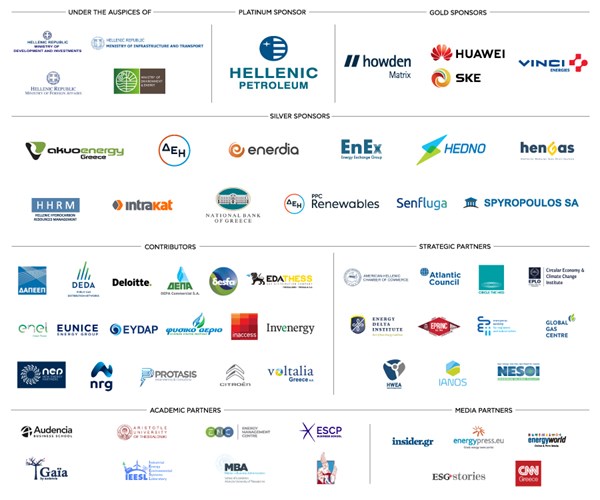
|



